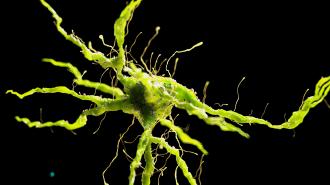Researchers have identified a second person whose genes appear to stifle a rare, but devastating form of Alzheimer’s — and the discovery could lead to treatments that protect others from all versions of the disease.
The anomaly: Approximately 1% of people with Alzheimer’s have a rare form called autosomal dominant Alzheimer’s disease (ADAD). Unlike most cases of Alzheimer’s, we know for sure that it is caused by genetic mutations, most often in the PSEN1 gene, and people with these mutations start experiencing cognitive problems early in life, usually in their 40s — 25 years earlier than is typical of Alzheimer’s.
In 2019, an international team of researchers reported the case of a woman with the PSEN1 mutation who didn’t start experiencing symptoms until her 70s. They also identified two mutations in her APOE gene — which is separately known to influence Alzheimer’s risk — as being potential causes for her longer protection, suggesting possible targets for future treatments.
Genetic sequencing revealed that the man didn’t possess the same genetic mutations as the woman.
Two of a kind: Now, those same researchers have reported the case of a man with the ADAD-causing mutation who didn’t experience cognitive problems until he was 67 years old.
When they compared him to the woman, they saw that both had amyloid plaques throughout their brains, as is expected of someone with Alzheimer’s. However — usually for Alzheimer’s patients — neither person had significant amounts of tau protein in a part of the brain called the “entorhinal cortex.”
The difference: Genetic sequencing revealed that the man didn’t possess the same APOE mutations as the woman, though. Instead, he had an unusual mutation in another gene: RELN.
The researchers already have an idea why mutations in these two different genes might have the same effect, too: they each produce molecules that bind to the same cellular receptors (VLDLR and APOEr2).
This is the first study to highlight this pathway as potentially delaying cognitive impairments in Alzheimer’s.
This suggests that molecules from the mutated genes interact with those receptors in a way that’s different from molecules from unmutated genes, and that the difference somehow confers resilience against Alzheimer’s.
While it’s impossible to draw any definitive conclusions from just two cases, the researchers say that theirs is the first study to highlight this particular molecular pathway as potentially delaying cognitive impairments in Alzheimer’s — making it a worthwhile target for future research.
We’d love to hear from you! If you have a comment about this article or if you have a tip for a future Freethink story, please email us at [email protected].






